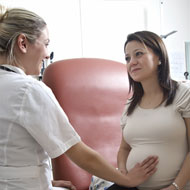- General Articles
- General Pregnancy Questions
- Baby Growth
- Pregnancy Diet
- Miscarriage
- During Pregnancy
- Twin Pregnancy
- Toddler Meals
- Home Remedies During Pregnancy
- Breastfeeding
- Pregnancy Week By Week
- Pregnancy Tests
- Ectopic Pregnancy
- Pregnancy Signs and Symptoms
- Pregnancy Stages
- Potty Training
- Fetal Development
- Preschooler
- Postpartum Depression
- Toddler Illness
- Baby Care
- After Pregnancy
- Molar Pregnancy
- During Delivery
- Beauty and Style
- Pregnancy Clothing
- Preconception
- Fertility
Causes, Symptoms & Treatment for Chemical Pregnancy
A chemical pregnancy is a clinical term for an early miscarriage that occurs before the fifth week of gestation. Thanks to the ultra sensitive pregnancy tests now available, it is possible to test positively for a pregnancy even three to four days before your period is due. But before the fetus can develop or a heartbeat is detected on an ultrasound (a clinical pregnancy develops), a miscarriage occurs. The period then appears a few days later.
Chemical pregnancies are in fact very common and almost 60 percent of first pregnancies that end in early miscarriage can be attribute to this condition. Experts also insist that the numbers may be even higher except for the fact that many women do not even know that a chemical pregnancy and miscarriage has taken place.
What Causes a Chemical Pregnancy?
Chemical pregnancies can be caused by a number of factors such as:
- Chromosomal abnormalities in the fetus are the most common cause of a chemical pregnancy. At the time of conception, these abnormalities prevent the fetus from developing properly and a miscarriage occurs
- Inadequate lining of the uterus
- Abnormalities of the uterus
- Fibroids can interfere with normal implantation of the fertilized egg
- Low hormone levels can lead to difficulties in maintaining a healthy pregnancy
- Luteal Phase Defect (LPD) where the uterus is not in the correct phase to accept the implantation of the egg
- Certain infections
- Blighted ovum
Symptoms of a Chemical Pregnancy
Many women are not even aware that they have had a chemical pregnancy and chalk their symptoms down to a late period. However, if you are carefully monitoring your ovulation and menstrual cycles, you will be able to recognize the signs and grieve your loss for what it is – a very early miscarriage of a pregnancy. Some symptoms of a chemical pregnancy are:
- A positive pregnancy test
- Vaginal bleeding that occurs even after you test positive
- Low hCG levels in your blood test that decrease rather than increase as with a normal pregnancy
- Abdominal cramps
- Late period
- Lighter period than normal
Diagnosis of Chemical Pregnancy
Your doctor will require a few hCG tests to check the corresponding increase of hCG levels in the case of a normal pregnancy. An ultrasound may also be performed to check for implantation of the embryo and to detect a heartbeat. If neither is found, the diagnosis can be confirmed.
Treatment of a Chemical Pregnancy
If you suspect that you may have a chemical pregnancy, consult your doctor at the earliest. He will monitor your hCG levels to check if a miscarriage has occurred or not. Most cases of chemical pregnancy end in the natural or spontaneous abortion of the contents of the uterus before the 12th week. If this does not happen, your doctor will perform a D&C (dilation and curettage) to remove the excess tissue from the uterus and to stop the bleeding. This also helps prevent any serious infection from developing. In case the empty placenta is carried beyond the 12th week, medical attention is required to ensure the health and safety of the mother. If the cause of the chemical pregnancy is an infection, a course of antibiotics can help. Fibroid surgery or hormonal treatment can help address the other possible causes of chemical pregnancy.
Coping with a Chemical Pregnancy
A large number of women who have chemical pregnancies go on to have multiple healthy pregnancies later on. In fact, the chances of having another chemical pregnancy are quite small. In most cases of early miscarriage such as one when a chemical pregnancy ends, most doctors encourage immediate attempts to try and get pregnant again. Some may suggest that you wait a while but the decision is ultimately up to you. Fortunately there are no long-term complications or side effects of a chemical pregnancy and recovery is almost instantaneous. So, if you feel like trying right away, there is nothing to stop you.
For women who have difficulties getting pregnant, a chemical pregnancy can be as devastating as losing the baby later on. For others, it may have no effect whatsoever. Regardless of what people say, you do not have to justify your feelings of loss, grief or even relief to anyone. Everyone reacts differently to a chemical pregnancy and there is no single ‘right’ response in such cases.
Preventing a Chemical Pregnancy
In general, a chemical pregnancy cannot be prevented. In case you suffer from recurring pregnancies of this type, further investigation into what could be causing the problem is required. Once a diagnosis is reached, the correct treatment can be prescribed. This may include adding vitamin B6 supplements to your daily diet, medications such as baby aspirin, or topical treatments such as progesterone cream.
Read more articles from the During Pregnancy Category.



 7 Must-Haves Before Your Baby Arrives
7 Must-Haves Before Your Baby Arrives Bonding Games for Babies
Bonding Games for Babies DIY Baby Bath Towel Apron
DIY Baby Bath Towel Apron Common Late Pregnancy Fears
Common Late Pregnancy Fears